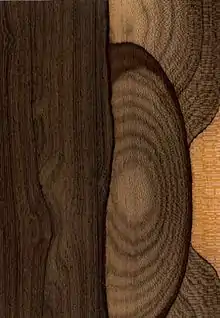Cordia dodecandra
Cordia dodecandra (common name: ziricote) is a small tree in the borage family (Boraginaceae) native to southern Mexico, Central America, and the Caribbean.[1]
| Cordia dodecandra | |
|---|---|
.jpg.webp) | |
| At the sitio arqueológico Uxmal in Yucatán, Mexico | |
| Scientific classification | |
| Kingdom: | Plantae |
| Clade: | Tracheophytes |
| Clade: | Angiosperms |
| Clade: | Eudicots |
| Clade: | Asterids |
| Order: | Boraginales |
| Family: | Boraginaceae |
| Genus: | Cordia |
| Species: | C. dodecandra |
| Binomial name | |
| Cordia dodecandra | |
| Synonyms[1] | |
| |
Description
Cordia dodecandra grows to a maximum height of 25–30 ft (7.6–9.1 m) at maturity. Flowers are produced in clusters at branch ends from February to May. Each flower is two inches wide, bright orange in color, tubular, flaring (salverform) with 11–18 lobes, bearing 13–18 stamens that are not equal in length. Short stamens are intercalated between long ones, resulting in two levels of stamens. The species is heterostylous and has been shown to be self-incompatible.[2] White fruits follow the flowers, averaging two inches in length. The fruits are locally made into sweets.
Uses

Ziricote wood is dark brown in color and has a Janka hardness of 1,970 lbf. It is used for furniture, veneer, cabinetry, flooring, gun stocks, musical instruments (including guitars and ukuleles), entrance doors, turnings, decorative beams, trim, and small specialty items.
Gallery
.jpg.webp)
References
- "Cordia dodecandra A.DC". Plants of the World Online. Royal Botanic Gardens, Kew. Retrieved 24 January 2020.
- Canché-Collí, César (June 2014). "Distylous traits in Cordia dodecandra and Cordia sebestena (Boraginaceae) from the Yucatan Peninsula". Botanical Sciences. 92 (2): 289–297.
